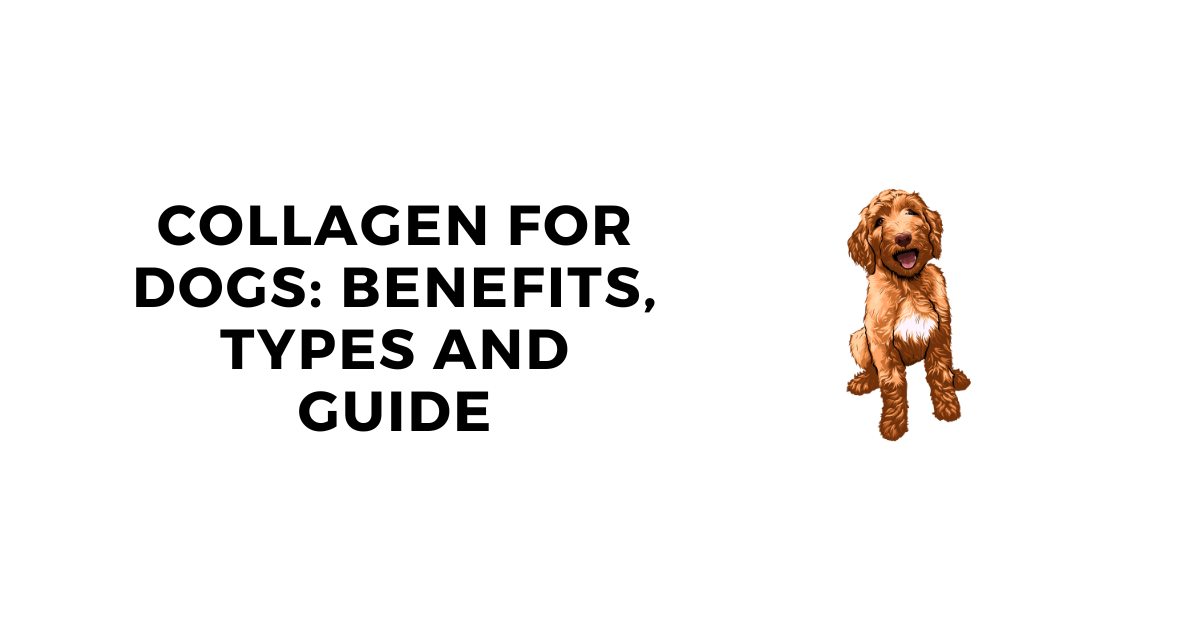
Collagen for Dogs: Benefits, Types and Complete Guide
Collagen for Dogs
Your dog is active, struggling with stiffness, pain, skin or coat issues and you want to help ease their discomfort. You've heard that collagen is good for humans, but is it good for dogs too?
There are many different types of collagen supplements available for dogs and it can be overwhelming to try and figure out which one is right for your pet.
This guide will provide you with all the information you need to make an informed decision about whether or not giving your dog a collagen supplement is right for them.
I'll cover the different types of collagen, the benefits and side effects, and when to give it to your pup.
Collagen Benefits for Dogs
Collagen benefits for dogs include bone and joint health, helps reduce gut inflammation, supports coat health, gut health, digestion, enticing picky eaters and immune system support.

1. Helps Maintain Strong Bones and Joints
Collagen is a crucial protein that forms the structural framework of various connective tissues in the body, including bones, joints, tendons and ligaments. As dogs age, their natural collagen production can decrease, leading to a gradual deterioration of these vital tissues.
By incorporating collagen into their diet, you can provide your canine companion with the necessary building blocks to support their bone and joint health.
I give both of my dogs (Atlas and Nitotem) collagen rich bone broth as a meal topper. Their joints have never been stronger. Atlas used to struggle on walks as he gets older. But now he is as chipper as when we was a puppy.
This is likely because it helps to maintain and repair cartilage, which acts as a cushion between the bones in a joint. By promoting the regeneration of cartilage, collagen can contribute to improved joint function and mobility for your dog.
Multiple studies, including one published in PubMed Central in 2021, have found that supplementation can be effective for maintaining cartilage health and reducing symptoms of osteoarthritis (1).
Bone Health
Collagen is an essential component of bone tissue. By enhancing collagen levels, you can support the strength and density of your dog's bones, reducing the risk of fractures or other skeletal issues.
Aging dogs or those with joint conditions such as arthritis may experience discomfort and pain. Collagen's anti-inflammatory properties can help alleviate joint inflammation and provide relief from pain, promoting a more active and comfortable lifestyle for your furry companion.
A study published in PubMed in 2017 found that dogs treated with a diet supplement including hydrolyzed collagen had reduced pain markers compared to the control group in a number of ways (2).
2. Supports a Shiny Coat
A healthy and shiny coat is often a reflection of your dog’s overall well-being. Collagen helps to strengthen the hair follicles, reducing the risk of breakage and brittleness. This can result in healthier, stronger hair strands, which contribute to a shiny and lustrous coat.
The health of your dog's skin is closely linked to the condition of their skin. Collagen supports the maintenance of healthy skin by promoting its elasticity and hydration. This can help prevent dryness, flakiness and itchiness, which can impact the overall appearance of the coat.

My husky Nitotem suffered from Parvovirus when he was a puppy. He almost didn't make it. Once I got him (he's a rescue) he had a spotty coat and lots of skin health issues.
Now that he has years of collagen from bone broth, his coat is rich and full and he's the most handsome husky you've ever seen. I'm not biased at all, I swear.
By supporting the regeneration of hair follicles, collagen can contribute to faster and healthier hair growth, leading to a fuller and more vibrant coat.
3. Helps Reduce Gut Inflammation
Just like humans, dogs can experience digestive issues and incorporating collagen into their diet may help support a healthy gastrointestinal system. That is because it is full of specific amino acids glycine and proline, which have anti-inflammatory properties.
These amino acids may help reduce gut inflammation and promote a healthier digestive environment for your dog. A study published in Scientific Research in 2017 found that dogs treated with collagen peptide supplementation had significantly reduced inflammation (3).
The gut lining acts as a barrier between the digestive tract and the rest of the body. When the gut lining becomes compromised, it can lead to inflammation and various digestive issues.
This protein supports the integrity of the gut lining, helping to maintain its strength and reduce the risk of inflammation and leaky gut syndrome.
Lastly, the amino acids in it stimulate the production of digestive enzymes. These enzymes play a crucial role in breaking down food and aiding in nutrient absorption. By promoting the production of these enzymes, collagen can enhance the overall digestive process for your dog.
Looking for dog food? Read my guide to find the best freeze dried dog food.
4. Helps Improve Appetite and Digestion
When it comes to your dog's appetite and digestion, collagen can offer several potential benefits. By incorporating it into their diet, you may help support their digestive system and enhance their appetite.
Choose a high protein bone broth for dogs to supplement your dog’s diet and you’ll likely find, like I did, that appetite is improved immediately.
Just because the broth is so yummy! I mean, I eat it up, so why shouldn’t my dog?
However, collagen goes further to improve appetite. Collagen has been reported to help stimulate appetite in dogs, making mealtime more enjoyable for them and ensuring they receive the necessary nutrition.
Glycine, proline and glutamine can help improve digestion by promoting the production of stomach acid and aiding in the breakdown of food.
By supporting the health of the gut lining, collagen can potentially help reduce digestive issues, such as leaky gut syndrome and improve overall gut health.
5. Helps Strengthen the Immune System
Arginine and glutamine have potent immune-enhancing properties. These amino acids can help support the production of immune cells and antibodies, strengthening the immune system's ability to defend against pathogens and promote overall immune function.
Chronic inflammation can negatively impact dog's immune systems and compromise its effectiveness.
Glycine and proline have anti-inflammatory properties, as shown in many studies and documented in a review of collagen peptides in dogs published in Research Gate in 2017 (4). By reducing inflammation, collagen may help support a balanced immune response.

And lastly, this unique protein plays a vital role in wound healing, which is closely connected to the immune response. By supporting the formation of new tissues and promoting proper healing, collagen can aid in the recovery process and support the immune system's ability to respond to injuries or infections.
Types of Collagen for Dogs
When it comes to collagen supplementation for dogs the main types are marine/fish, chicken, bovine (beef) and bone broth.
- Marine/Fish Collagen: Marine collagen is derived from the skin, scales or bones of fish, such as salmon or cod. It is known for its high bioavailability and is rich in type I collagen, providing support for various tissues in dogs.
- Chicken Collagen: Chicken collagen is sourced from the bones, cartilage and connective tissues of chickens. It is often rich in type II collagen, which is beneficial for joint health. Chicken collagen can help support the health and function of joints, cartilage and tendons in dogs.
- Bovine Collagen: Bovine collagen is derived from the skin, bones and connective tissues of cows. It is primarily type I and type III collagen. Bovine collagen can provide structural support for the skin, bones, tendons and ligaments in dogs.
- Bone Broth: Bone broth is a liquid made by simmering animal bones and connective tissues, such as chicken or beef bones, for an extended period. It is a natural source of collagen, providing a variety of collagen types, minerals and amino acids. Bone broth can offer numerous health benefits, including support for joint health, digestion and the immune system in dogs.
If you want to know more about bone broth, read my ranking of the best bone broth for dogs.
When selecting a collagen type for your dog, it's important to consider their specific needs, any allergies or sensitivities they may have and consult with your veterinarian for guidance on the most suitable option. Take your dog’s preferences into account as well. Most dogs adore a beef bone broth, but not all.
How to use collagen supplements for your dog
Step 1: Choose your collagen supplement (powder, chews, etc)
Collagen supplements for dogs are available in various forms, such as powder, chews or liquid. Consider your dog's preferences and any specific recommendations from your veterinarian when selecting the appropriate form. Remember that foods high in collagen, like bone broth and cartilage treats, can also count as supplements.
Step 2: Determine the amount you need to give your pet
The dosage of collagen supplement for your dog can vary based on factors like their size, age and specific health needs. Consult with your veterinarian to determine the appropriate dosage and frequency for your dog. They can provide personalized guidance based on your dog's individual requirements.
Step 3: Begin giving it to them
Once you have the collagen supplement and the recommended dosage, administer it to your dog according to the instructions provided. Collagen powders can be mixed with their regular food or water, while chews can be given as treats. Ensure that your dog consumes the supplement as directed.
Step 4: Be sure to keep track of your pets' progress
Keep a record of your dog's progress after starting the collagen supplement. Observe any changes in their health, coat condition, mobility or other specific areas you are targeting with it.
If needed, consult with your veterinarian to assess the effectiveness of the supplement and make any necessary adjustments to the dosage or form of collagen.
Read my guide to the best meal toppers for dogs.
Keep in mind WHEN you give your dog the collagen as well. A study published in the Oxford Academic in 2022 found collagen supplementation helpful for reducing pain and mobility in healthy Labrador Retrievers during an exercise regimen.
Dogs who received the collagen had less pain if they were “loaded” with collagen two weeks prior to exercise (5). So, if you’ve got a trip planned, start the collagen supplement now!
Are there any side effects of giving collagen supplements to dogs?
Collagen supplements are generally not bad for you or your dog when used properly. However, like any supplement, there can be potential side effects or considerations to keep in mind. Here are a few points to consider regarding collagen supplementation for dogs:
- Allergies: Dogs can have allergies or sensitivities to specific sources of collagen, such as fish, chicken or beef. If your dog has a known allergy to a particular type of collagen, it's important to avoid that specific collagen source or choose an alternative type that is suitable for your dog.
- Digestive Upset: In some cases, dogs may experience mild digestive upset when introduced to a new supplement, including collagen.
- This can manifest as loose stools, gas or changes in appetite. If you notice any digestive issues after starting collagen supplementation, it's advisable to consult with your veterinarian to assess the situation and determine the best course of action.
- Interactions with Medications: If your dog is on any medications, it's essential to consult with your veterinarian before starting collagen supplementation.
- Some medications may interact with collagen or its components, potentially affecting their effectiveness or causing adverse reactions. Your veterinarian can provide guidance on any potential interactions and adjust medication dosages if necessary.
- Overdosing: Giving excessive amounts of collagen to your dog can lead to imbalances in their diet or nutrient intake. It's crucial to follow the recommended dosage guidelines provided by your veterinarian or the collagen supplement manufacturer.
- Giving too much collagen may not necessarily result in immediate harm, but it's best to maintain an appropriate balance in your dog's overall nutrition.
As with any supplement or dietary change, it's always advisable to consult with your veterinarian before starting your dog on collagen supplementation. They can evaluate your dog's specific health needs, consider any potential interactions or sensitivities and provide personalized recommendations.
If you’re worried about dosing, it’s good to start with a safe, easily digestible form of food that has collagen, like bone broth. The best bone broth for dogs is usually beef and I like the grass fed one from Bluebird Provisions.
But some dogs tolerate chicken better or love the taste of fish broth. You won’t know until you slop some in their bowl!
What is the best collagen supplement for dogs?
When I was determined to find a solution to help alleviate my dog's achy joints. I stumbled upon collagen supplements and learned about their potential benefits for joint health in dogs. Excited by the possibility of finding relief for my two dogs, I decided to give collagen a try.
However, there was a challenge. My dogs absolutely despised taking pills and capsules. They left them in their bowl after eating the rest of their food. How do they even do this?

That's when I came across bone broth. I just thought they'd like it! And that it had some minerals and electrolytes for dogs that he could use. Little did I know it was a natural source of collagen! It seemed like the perfect solution.
Not only did they both eagerly lap up the bone broth, but I also noticed some remarkable changes in their overall well-being. Atlas's (my poodle) mobility seemed to improve as he moved around with less stiffness and discomfort. It was heartwarming to witness him regain some of his youthful energy.
As I mentioned above, Nitotem (my husky) coat started to shine more vibrantly than before. It was as if the bone broth was working its magic from the inside out. I couldn't help but attribute this improvement to the collagen content in the bone broth.
The fact that they both loved the taste of bone broth made incorporating protein into their routines much easier. It became a special treat for them and it brought joy to both of us.
Seeing their wagging tails and the excitement whenever they saw me preparing the bone broth made me confident that I had found the perfect solution.
In my experience, bone broth turned out to be an excellent alternative to collagen pills and capsules. It not only addressed their joint discomfort but also brought added benefits and joy to his life. However, some other form of collagen may work better for you. It’s all up to you and your dog.
Read my guide to dog food seasoning.
What is the difference between human collagen and dog collagen?
Human collagen and dog collagen are mostly the same thing, but there are some differences. If you want the best benefits of collagen for your dog, it’s important to note those differences.
- Source and Extraction: Collagen for human use is typically sourced from bovine (cow) origins, while collagen for dogs can come from various sources, including fish, chicken, bovine or porcine. The extraction methods and processing techniques may also vary depending on the source and intended use.
- Dosage and Administration: Collagen supplements formulated for humans are designed to meet the specific needs and recommended dosages for human consumption. Dog-specific collagen supplements are formulated with appropriate dosages and considerations for canine physiology, taking into account factors like size, weight and overall health requirements.
- Regulatory Considerations: Collagen supplements intended for human consumption are subject to regulations and standards specific to human dietary supplements. Dog-specific collagen products may adhere to regulatory guidelines for animal supplements and may have different labeling and packaging requirements.
What is the recommended dosage of collagen for dogs?
The recommended dosage of collagen for dogs varies dramatically. My friend’s teacup chihuahua could go swimming in my big dog’s bowl of bone broth.
The dog's size, age, specific health needs and the formulation of the collagen supplement all effect dosing. It is crucial to consult with your veterinarian for personalized advice and dosage recommendations based on your dog's individual requirements. They can take into consideration your dog's specific health condition and provide guidance on the appropriate dosage.
In general, the packaging or product label of the collagen supplement may provide recommended dosage guidelines based on the weight or size of the dog. It is essential to follow these instructions closely.
It's worth noting that collagen supplements may be combined with other ingredients or supplements that can affect the recommended dosage. For example, if a collagen supplement contains additional joint-supporting ingredients like glucosamine or chondroitin, the dosage may differ from standalone collagen products.
Are there any natural sources of collagen for dogs?
- Bone broth: Bone broth is one of the best natural sources of collagen for dogs, and my dog’s favorite. It is made by simmering animal bones, such as chicken or beef bones, along with connective tissues for an extended period, typically 24 to 48 hours. This slow cooking process helps extract the collagen, along with other beneficial compounds like amino acids, minerals and gelatin, from the bones and tissues. The beef one from Bluebird Provisions is the best dog bone broth out there.
- Fish: Certain fish, such as salmon and tuna, contain collagen-rich skin and bones. Feeding your dog fish with the skin and small bones can provide natural collagen along with essential omega-3 fatty acids.
- Chicken Feet: Chicken feet are an excellent source of collagen for dogs. They are high in connective tissues and collagen, making them a natural and chewy treat that can support joint health.
- Poultry Necks: Poultry necks, such as chicken or turkey necks, are rich in collagen and can be fed as a natural source of this beneficial protein. They also provide dental benefits by promoting chewing and helping to keep teeth clean.
- Pork Skin: Pork skin is another natural source of collagen for dogs. It can be given as a treat or used in homemade treats to provide the benefits of collagen.
- Gelatin: While not a direct natural source of collagen, gelatin derived from collagen can be added to your dog's diet. Gelatin is derived from boiling collagen-rich animal tissues, and it can be mixed with food or used to make homemade treats.
Closing Thoughts
There are many benefits of collagen for dogs, including joint health, skin and coat health, gut health and more. Collagen is a safe and effective supplement for dogs of all ages. But as always, talk to your vet before doing so.
Bluebird Provisions dog bone broth is a great source of collagen for dogs and can help improve their overall health. Try it today!
Have you used collagen or bone broth for your dog? How did it go? Leave a comment and let us know.
Sources
- https://www.ncbi.nlm.nih.gov/pmc/articles/PMC8541357/
- https://pubmed.ncbi.nlm.nih.gov/29262825/
- https://www.scirp.org/journal/paperinformation.aspx?paperid=77445
- https://www.researchgate.net/publication/318226414_The_Effectiveness_of_Specific_Collagen_Peptides_on_Osteoarthritis_in_Dogs-Impact_on_Metabolic_Processes_in_Canine_Chondrocytes
- https://academic.oup.com/tas/article/6/3/txac123/6677981
Disclaimer: The information in this article is for informational purposes only. It is not intended to be used to treat or supplement any pet's diet. Consult your veterinarian or animal health specialist if you have questions about anything related to their food, consumption or health. The statements have not been evaluated by the FDA, USDA or CFIA.

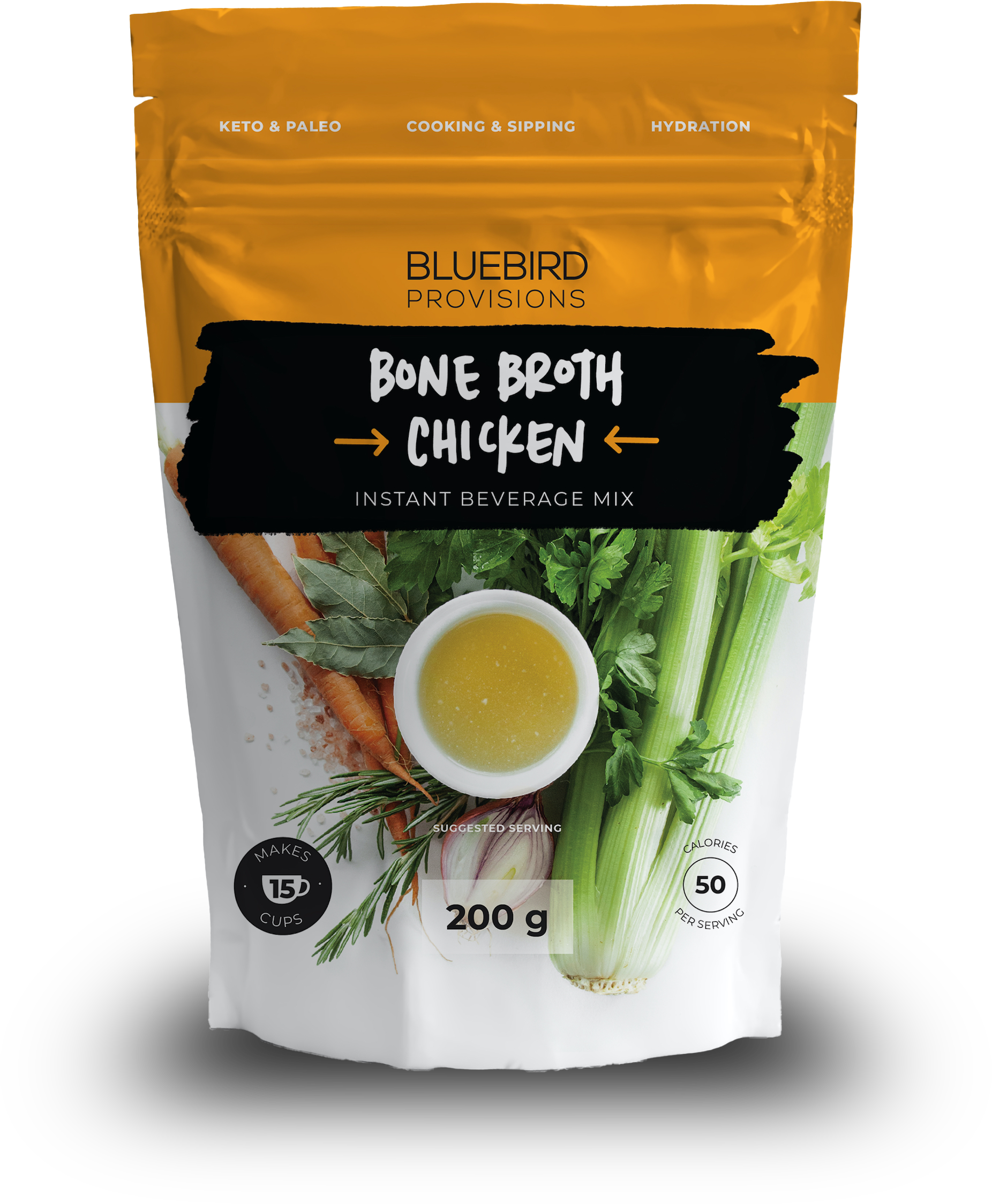
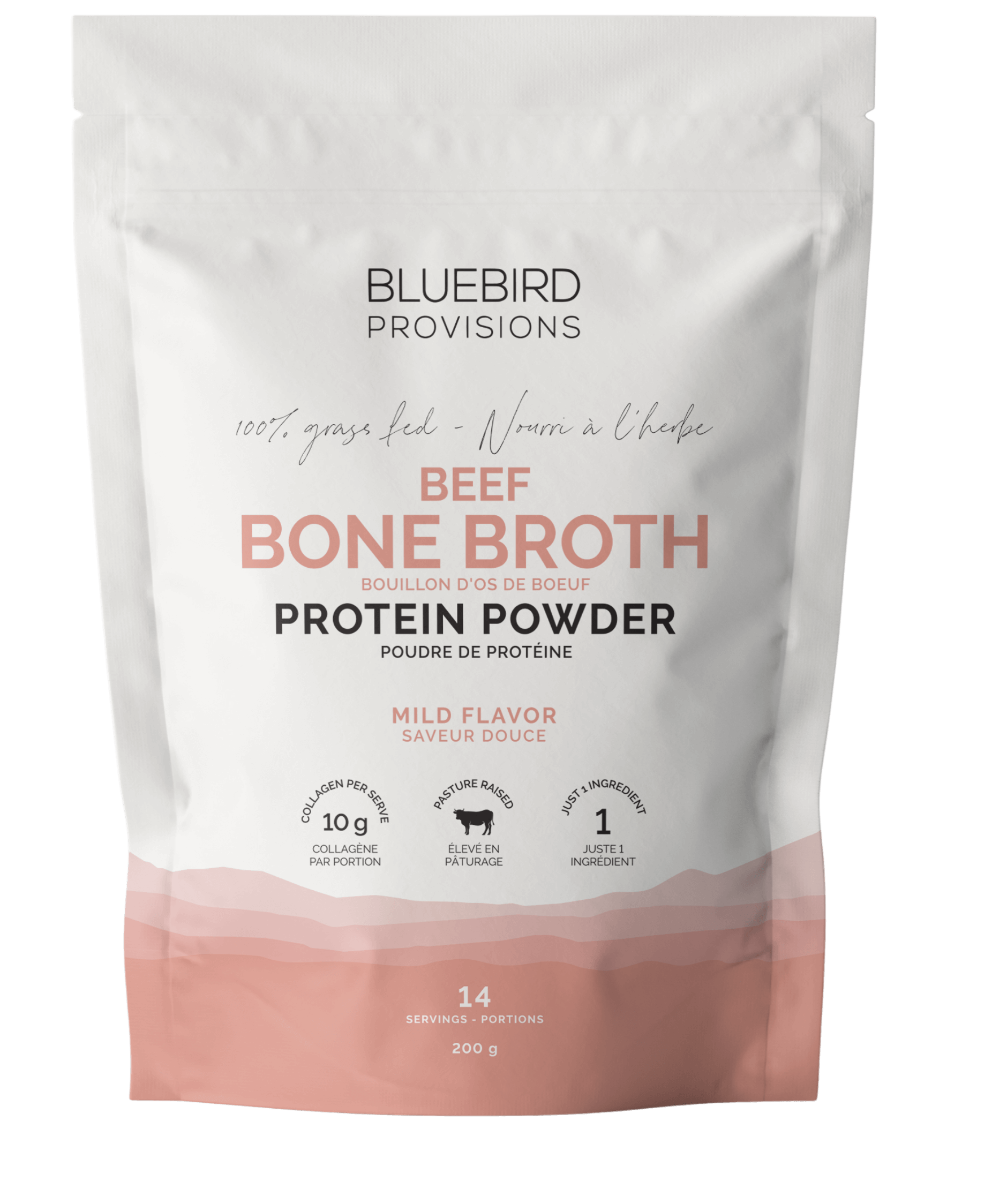
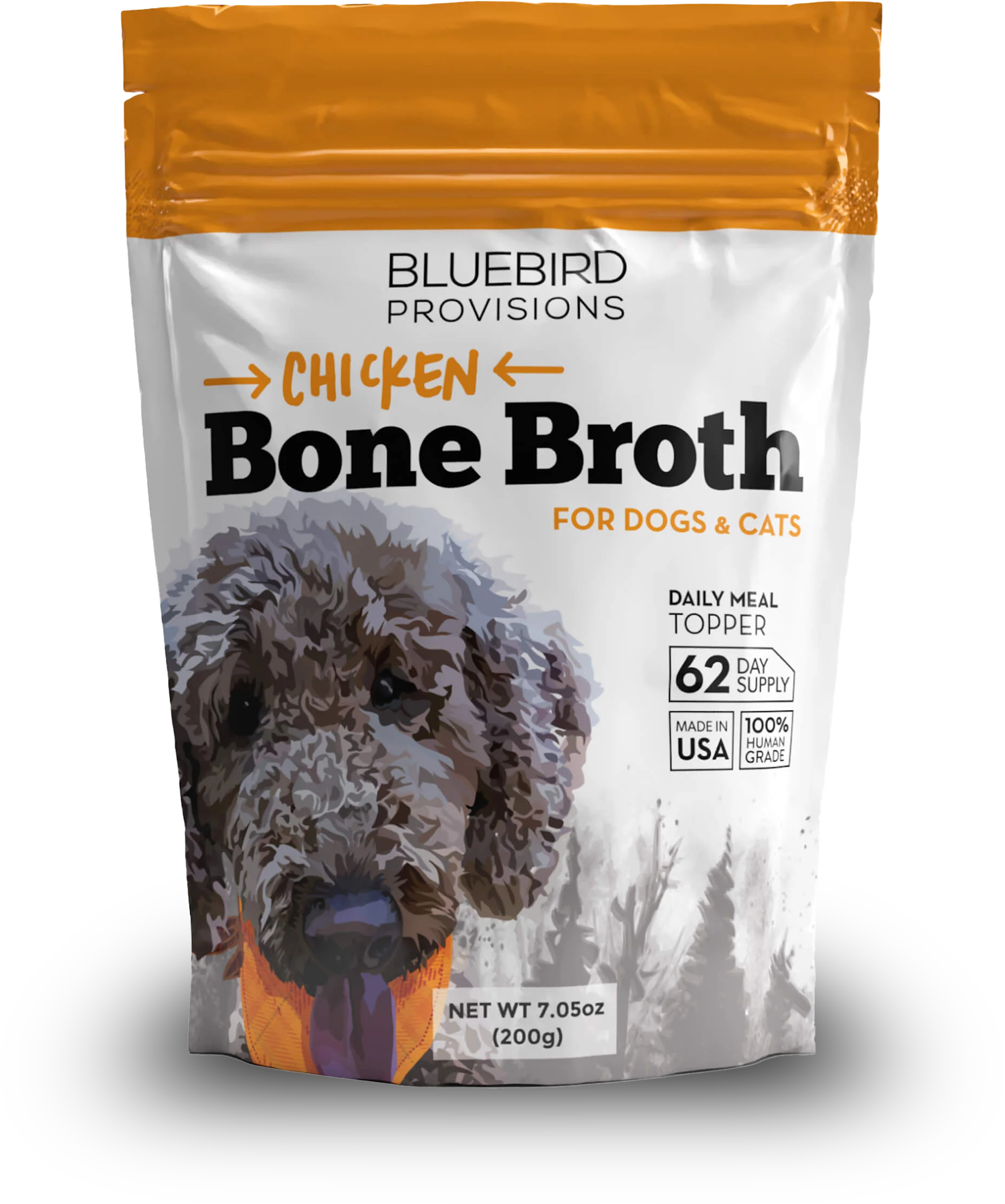
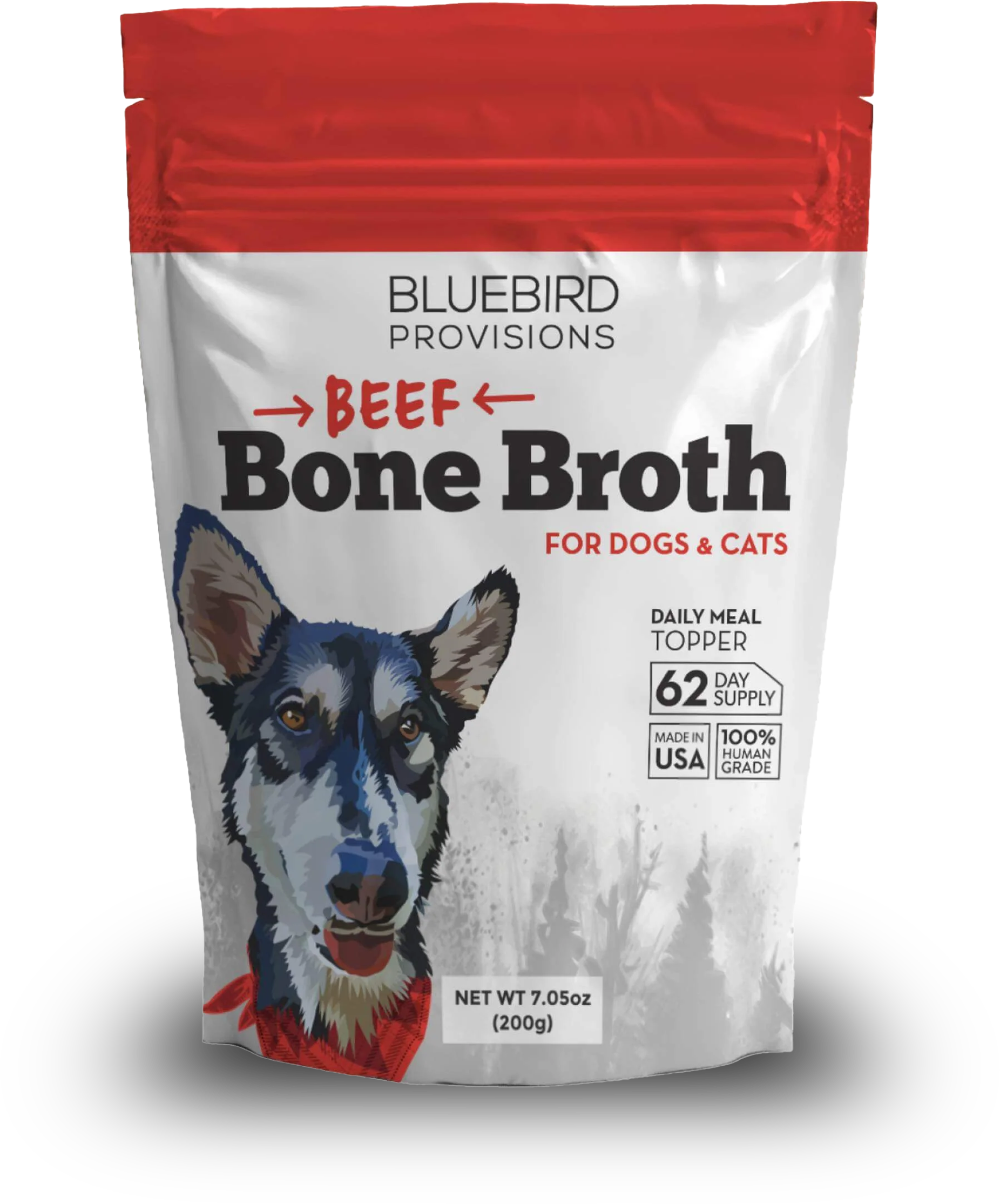
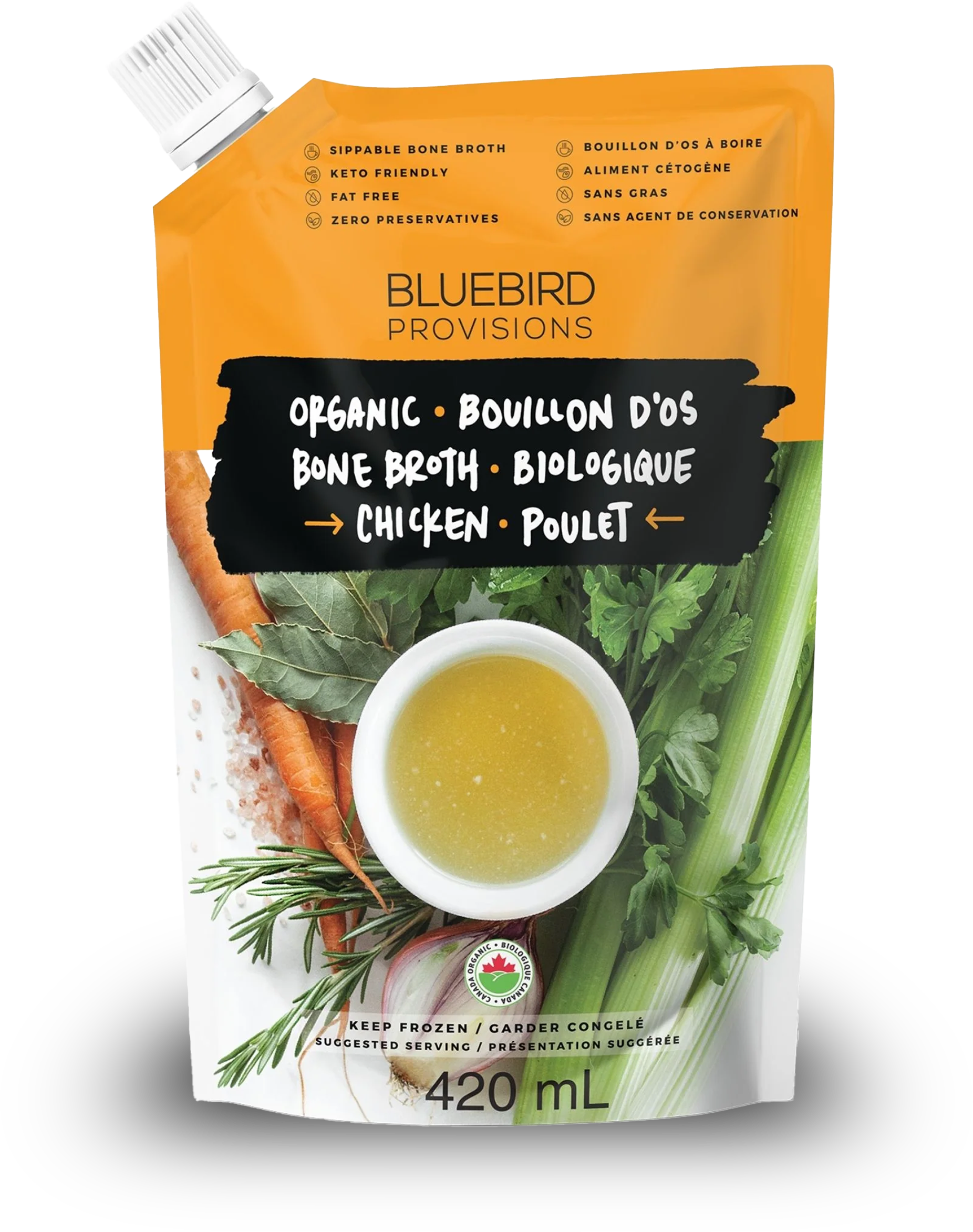
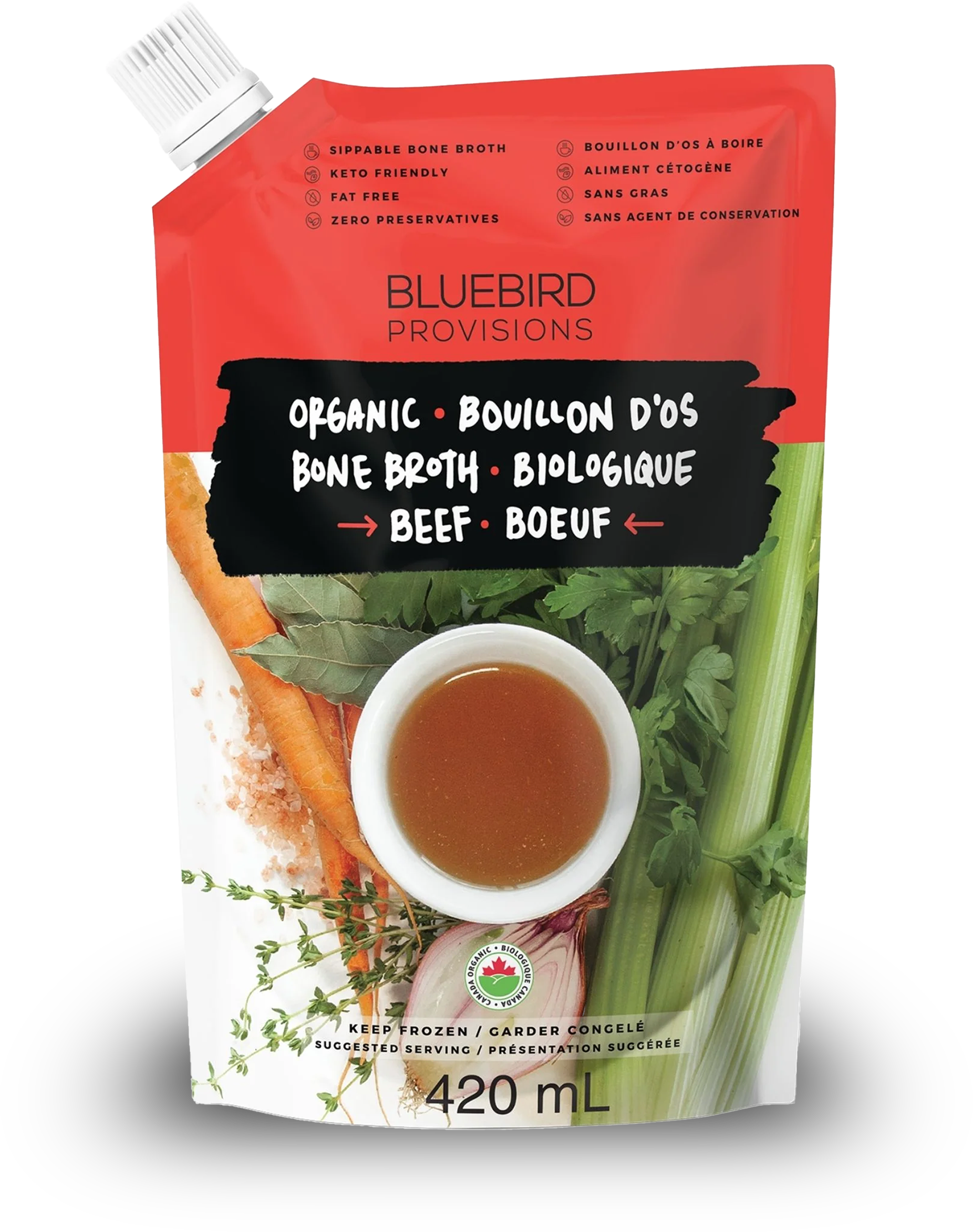
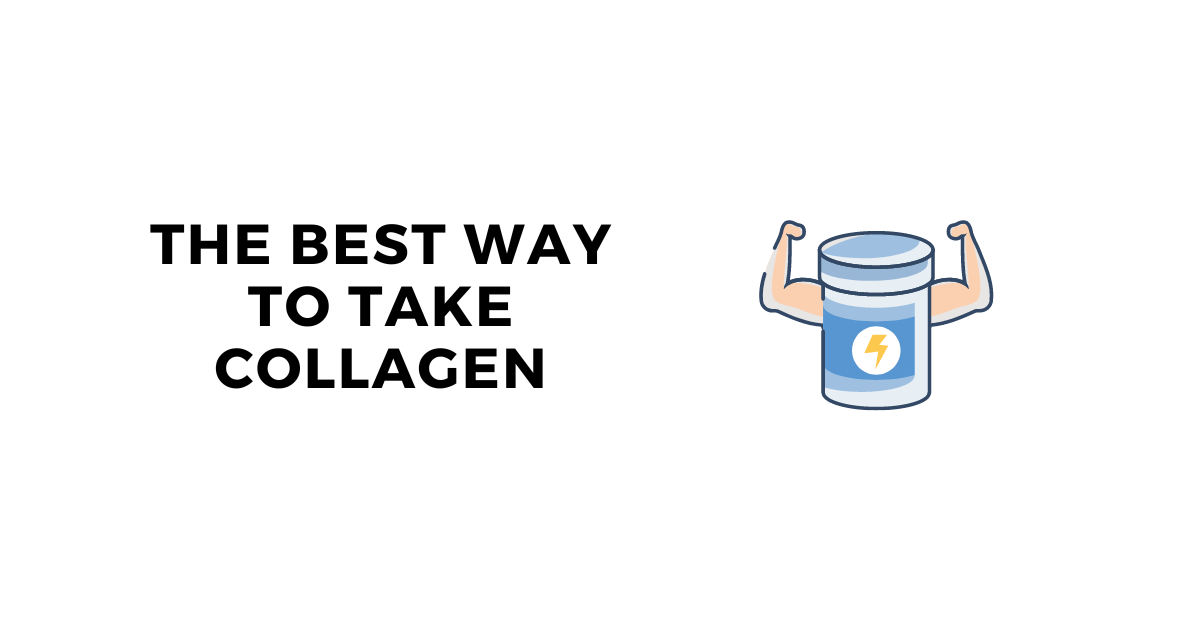
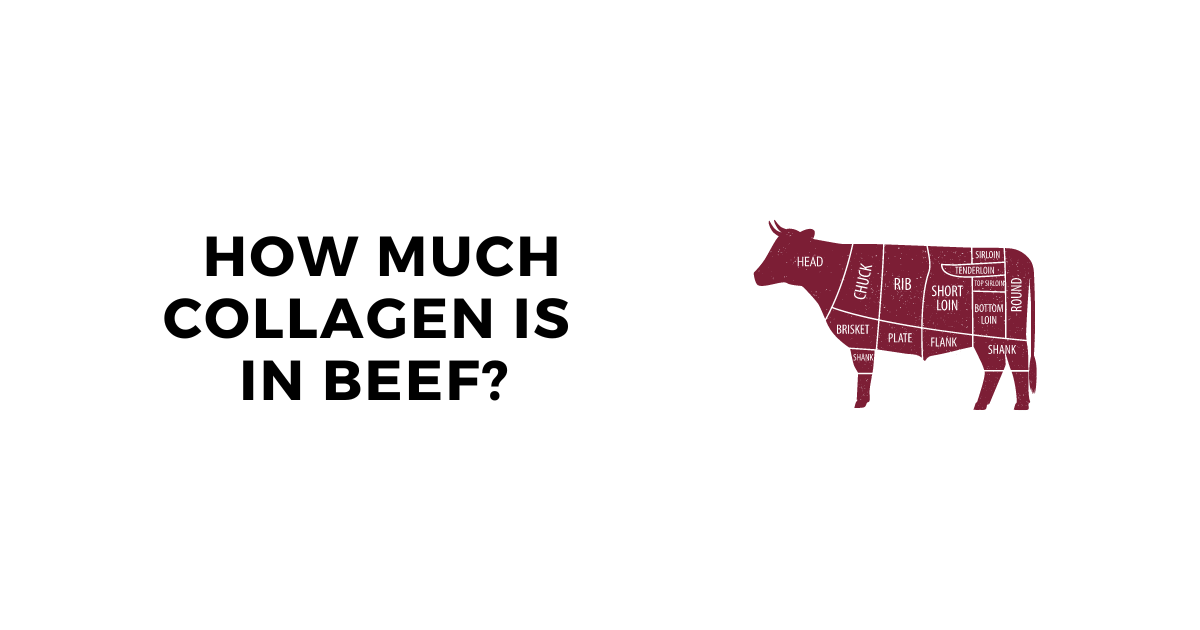
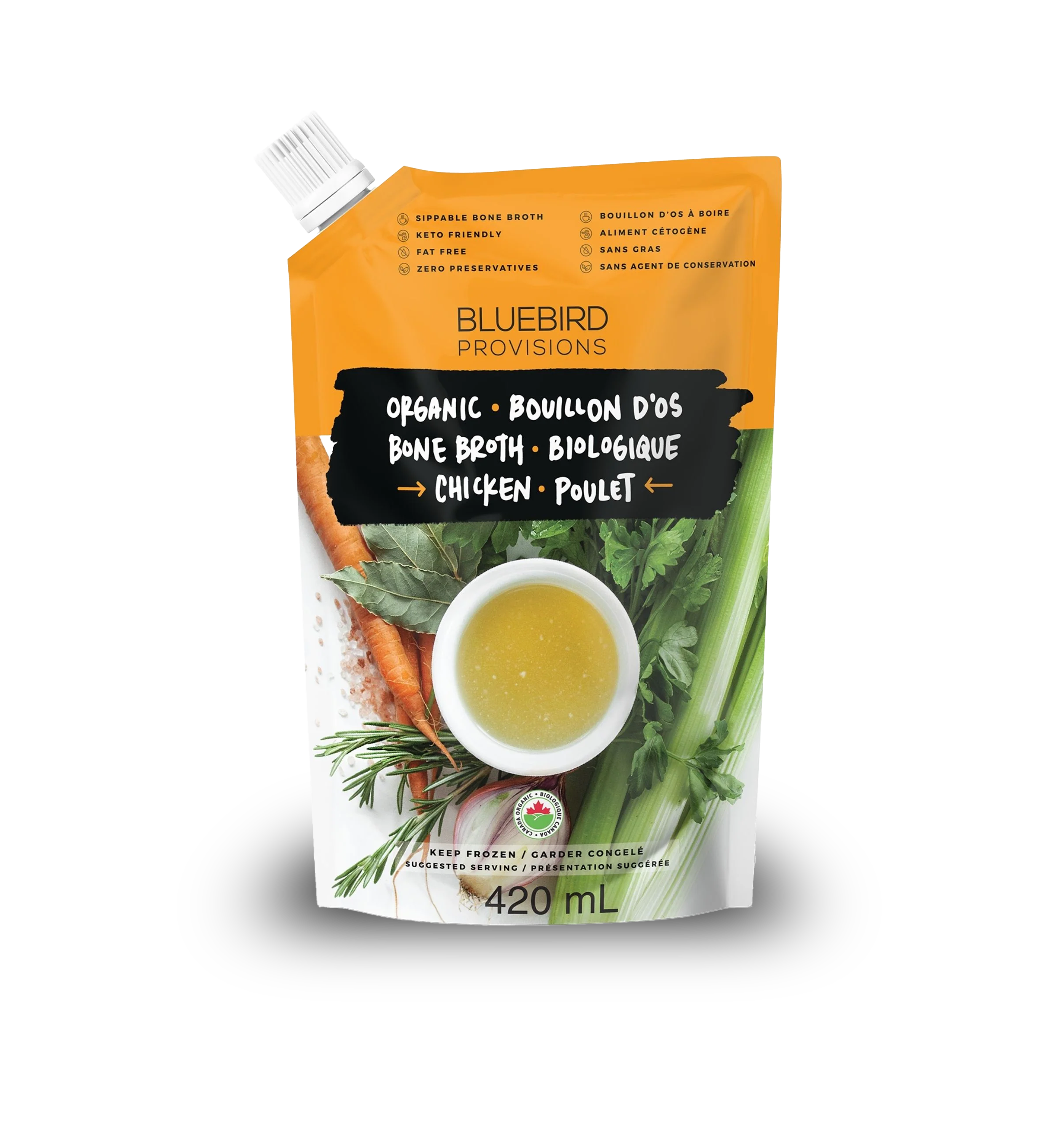
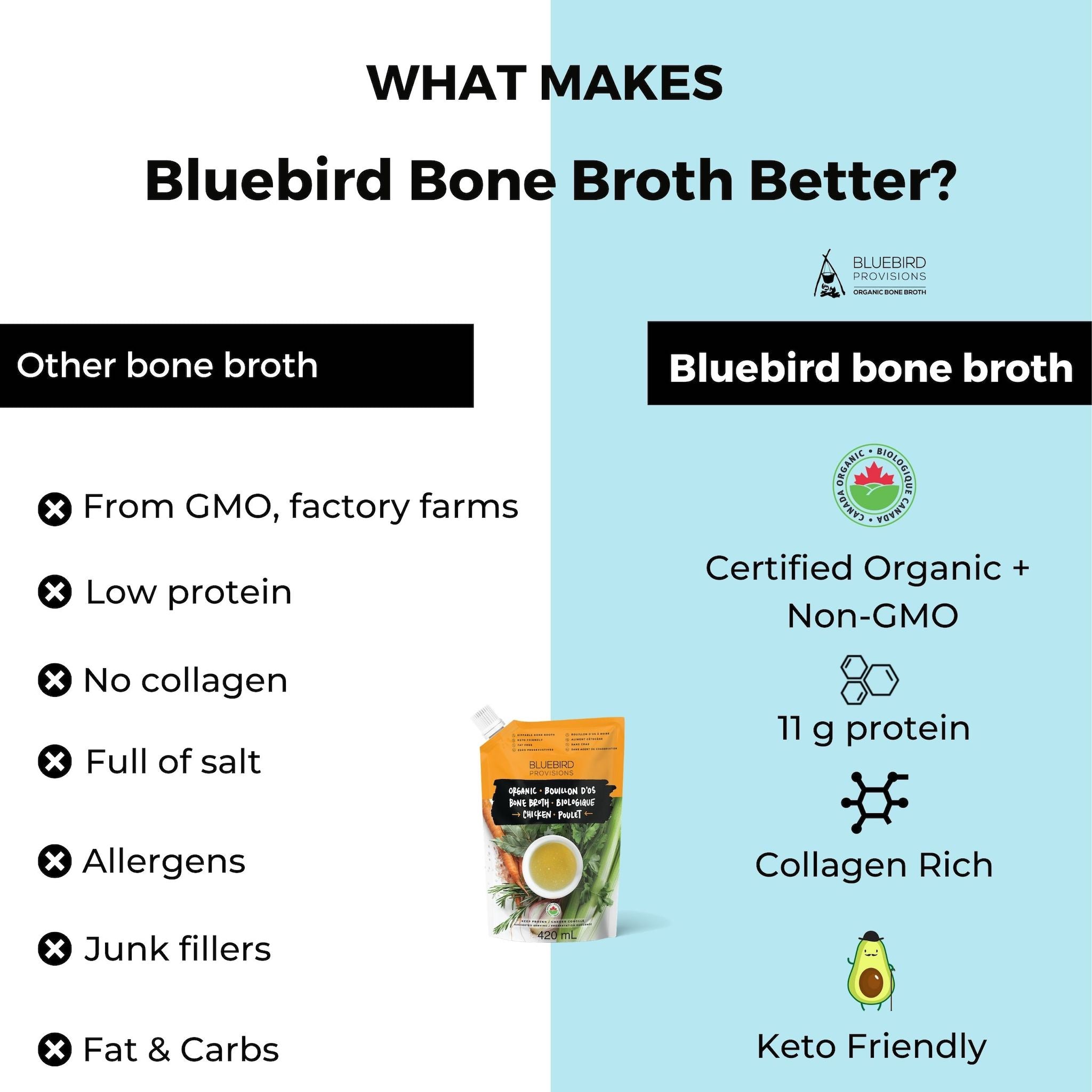
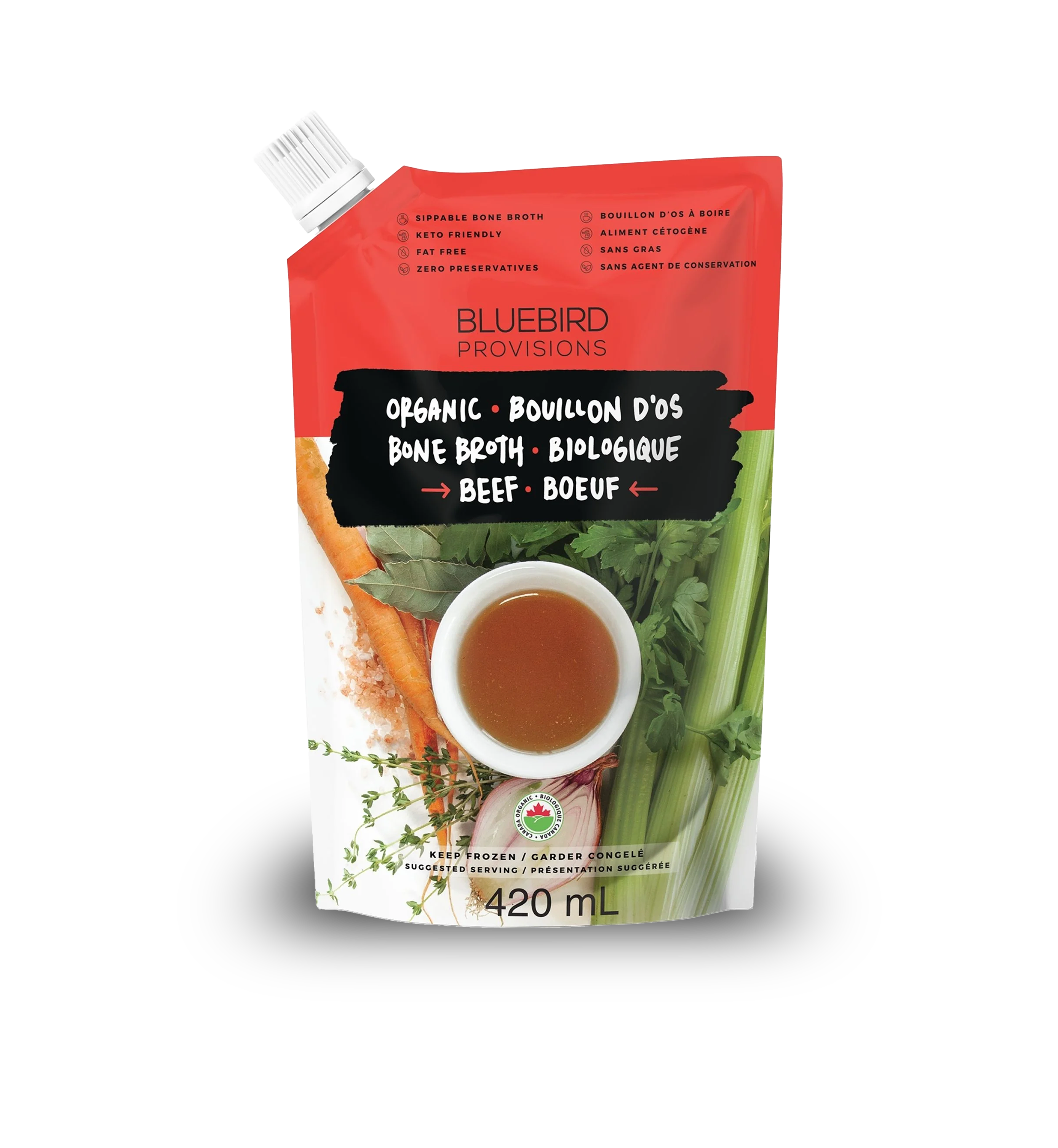
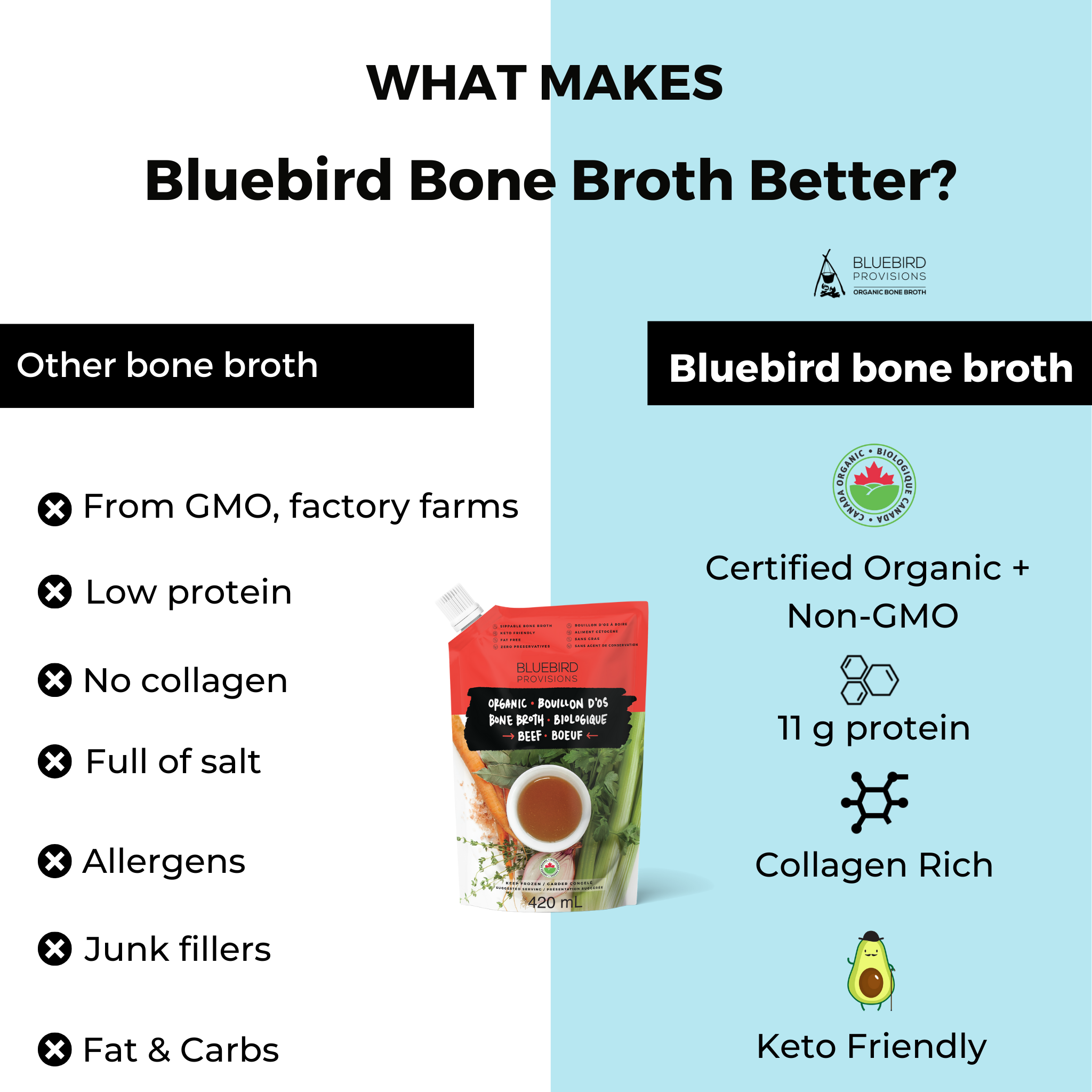
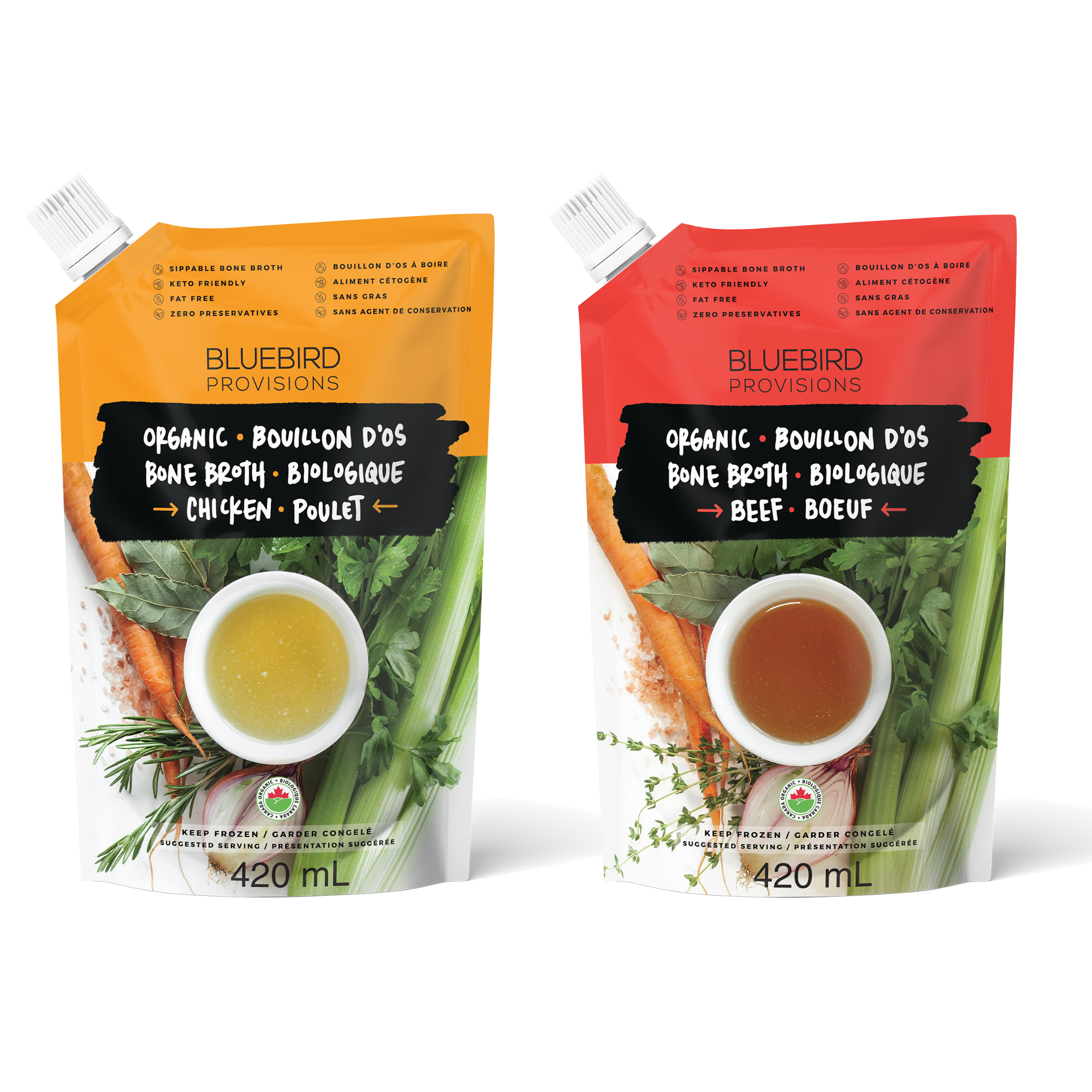

Leave a comment
This site is protected by hCaptcha and the hCaptcha Privacy Policy and Terms of Service apply.